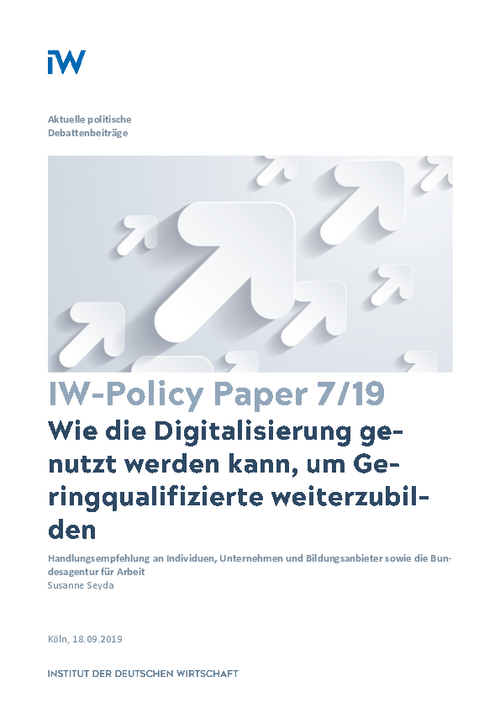The training participation of the low-skilled has increased significantly in recent decades. The main reasons are higher requirements and technical changes, which also affect the activities of low-skilled workers.

How digitisation can be used to educate the low-skilled
IW-Policy Paper

The training participation of the low-skilled has increased significantly in recent decades. The main reasons are higher requirements and technical changes, which also affect the activities of low-skilled workers.
In order to further strengthen the continuing education participation of semi-skilled and unskilled workers, all stakeholders are in demand: Companies should increasingly offer jobs on which workplace-oriented learning is possible and competences can be acquired. Even learning guides who ensure that certain skills are learned as part of the daily work process are important for the low-skilled. In addition to personal contact persons, the use of digital learning guides is also suitable. Training providers should take into account the specific requirements and hurdles of low-skilled persons and develop corresponding offers that, as a first step, also build up the self-learning skills. Self-learning competence describes the abilities to initiate and organize self-determined learning. As digital media allow an individual tailoring of learning content, they increase the motivation of the low-skilled and reduce learning hurdles such as lack of time, fear of failure and time pressure in classroom sessions. This will give the low-skilled more opportunities for further education and more responsibility for their own education and employment biography. Finally, public financial support in further training is relevant for the low-skilled as they are less likely to take part in continuing education, which is financed by the employer. Public funding for continuing vocational training should therefore continue to focus heavily on the low-skilled in order to sustainably increase their chances of employment through qualification measures. Here, too, it is important to examine the extent to which digital-based learning and workplace-oriented learning can also be used more intensively in the course of further education.

Susanne Seyda: Wie die Digitalisierung genutzt werden kann, um Geringqualifzierte weiterzubilden – Handlungsauftrag an Individuen, Unternehmen und Bildungsanbieter sowie die Bundesagentur für Arbeit
IW-Policy Paper

More on the topic

Data Utilisation and Data Sharing: The Potential and the Reality in German Companies
Companies that store their data extensively in digital form, process it in a structured manner and use it in a variety of ways can become particularly efficient members of the data economy.
IW
Intellectual property and fourth industrial revolution technologies: how the patent system is shaping the future in the data-driven economy
Using the classification system from the European Patent Office (EPO), we identify almost 600,000 patent applications for fourth industrial revolution technologies from 1986 to 2015.
IW